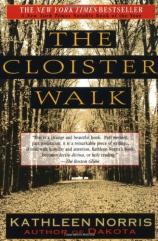Reading Group Guide
Discussion Questions
The Cloister Walk

1. In the book's preface, author Kathleen Norris admits that in the past she has employed literature as a substitute for religion in her life (p. xvii). What are the similarities for her between a writing apprenticeship and a spiritual quest? Why does the latter prove so much more fulfilling? What other things do people use as replacements for religion, and why do you think they so often fall short of the kind of life epitomized by the Benedictines?
2. Monks' lives are often difficult, and they are little understood by the rest of society. Why do they persist in their anachronistic lifestyle and practices? How would you answer the author's question: "Are monks wasting their time in seeking to convert themselves, and the world, from evil?" (p. 128) How did the book change your understanding of the monastic life? Did it inspire you to pursue these ideas further?
3. One of the wonderful paradoxes in this book is that only by immersing herself in life among celibates is the author finally able to understand and find peace in her marriage. How has the monastic life helped her in her relationship with her husband? What does she mean when she writes that all committed life is "sacred and self-transcendent" (p. 261), necessarily "ascetic" (p. 128), and that marriage can be "a school for love" ?
4. The author is continually amazed by the perspective of time in a monastery as compared to that of the world outside. Whereas time is considered by the Benedictines to be a gift, what is our culture's attitude toward it? How are these different attitudes reflected in the ways we treat our elderly and approach death? How is making peace with time vital to our being at ease with ourselves spiritually? How do the rituals and daily rhythms of monastic life force a re-evaluation of residents' experience of time?
5. What is the significance of the Rule of St. Benedict's instruction: "Keep death daily before your eyes" (p. 8)? How can this practice lead to forgiveness and love - and to the "conversion of heart" sought by all Benedictines? How can you employ this rule in your own life?
6. Prayer is sometimes described by the author as "the joy of just being with words" (p. 93). Has this been your experience? Is it enough? What is the role of silence in spiritual life, and why is silence so hard to come by in our culture? After reading this book, do you consider yourself skilled at listening? If not, did the book inspire you with ways to improve you "quality of attention" (p. 143)?
7. Celibacy is a little-understood lifestyle, and the author does much to illuminate it in this book. Do you agree that celibacy allows individuals to be of greater service to God and each other? Do you think the Catholic church should continue to require its priests, nuns, and monks to make this vow? Have you ever had a personal relationship with a celibate? If so, did he or she make you feel "appreciated, enlarged" as the author's friends have done (p. 121)?
8.Discuss the dramatic contrast between monastic culture and our consumer culture. How do your homes and workplaces differ from monasteries? Are you attracted to the alternative the author describes? How do you think you would adjust to the emphases on prayer, silence, and humility that characterize monastic existence?
9.The author's spiritual quest required unlearning the lessons and attitudes about church from her childhood. How was she able to let go of her youthful God's demand of practicing religion the "right" way (p. 92)? How do you think we can better expose children to religion so that they will more easily grow into a meaningful, mature relationship with God? Are there any of your own childhood experiences in established religion that have interfered with your spiritual development? If so, did the book provide you with ideas for overcoming the ways you have become exiled from your religion?
10. The author conveys several times her complete astonishment at finding herself a resident in a monastery. Have you ever experienced, as she does, a new environment that became life-changing? Was there any fear or resistance on your part? Did it make you subsequently more welcoming of new experiences?
11.Depression is a common malady in our culture, and the author writes movingly of her own encounters with it. How does the Word of God provide her with "a hope that no modern therapeutic approach can give" (p. 129)?
12.Do you think contemporary changes in liturgy to make it more accessible are detrimental to the practice of religion in the long run? What is the value of the traditional in comparison to that of the trendy? Do you agree with the author's insistence that keeping liturgy grounded in age-old metaphor and poetry is imperative if we are to preserve meaning and the "belief in the power of words to change things" (p. 154)?
The Cloister Walk
- Publication Date: April 1, 1997
- Paperback: 416 pages
- Publisher: Riverhead Trade
- ISBN-10: 1573225843
- ISBN-13: 9781573225847







